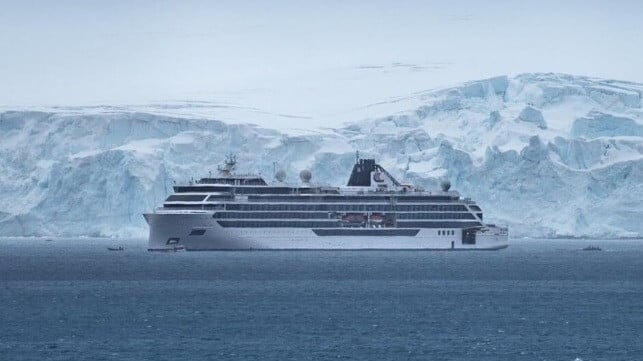Report: Windows Aboard Expedition Cruise Ship Couldn't Resist Fatal Wave

Norway's Accident Investigation Board has completed a review of the fatal accident aboard the expedition cruise ship Viking Polaris last November, when a high wave struck the side of the ship and broke multiple windows. The board has recommended improving the design standards for shipboard windows and has called on the operator to reinforce those aboard Viking Polaris and sister ship Viking Octantis.
On November 29, 2022, Viking Polaris was heading toward Ushuaia in order to medevac a passenger who had been injured in a Zodiac accident the day before. The weather was severe, and the ship was hit by a breaking wave when it was just southeast of Cape Horn, in the notorious Drake Passage. The wave broke seven cabin windows, causing major damage to the interior. One passenger was killed and eight others were injured.
Passengers aboard the ship described the experience of the wave's impact as feeling like the vessel had hit an iceberg. After-accident photos released by AFP showed several windows on a lower passenger stateroom deck had been broken in.
According to the Accident Investigation Board's reconstruction of the incident, an unfortunate combination of the wave and the vessel's course and speed caused the breakage. The crew could not have foreseen that a wave would break so high up and with so much power, the board concluded - but it also found that the windows could have been designed to withstand more force.
Viking Polaris was purpose-built for harsh Antarctic conditions, with an ice-class hull, stabilizers and roll tanks. The windows, however, were not designed for the force of the breaking wave that struck the ship in the Drake Passage, the board found. The waterway has some of the roughest average surface conditions anywhere, thanks to a powerful convergence of currents and the roaring winds that circle the Southern Ocean. In stormy weather, the waves in the passage can top out above 40 feet.
According to the Accident Investigation Board, "no rules have been identified for ships or ship windows that take into account the effect of breaking waves on the ship's side." The board said that it believes that "current rules for design pressure for windows located in this position provide too low values to withstand pressure loads from breaking waves." This is a question of class rules, and the board advised the vessel's class society to take the matter up with IACS and develop stronger international standards.
In the interim, Viking Polaris and Viking Octantis will still be exposed to prevailing surface conditions in the Antarctic region. "In the Drake Passage and other areas with similar weather conditions, there will be a likelihood of breaking waves that must be taken into account when operating in these waters," the board said. "The way the windows are dimensioned today, they will not be able to withstand the pressure of all breaking waves within the regulatory scope."
While awaiting a revision of class requirements, the board called on the Norwegian Maritime Authority to ensure that the operator of Viking Polaris and Viking Octantis "makes reinforcements" to ensure that breaking waves do not damage windows. AIBN called for a "robust" window design solution that accounts for breaking waves, not just operational measures to control risk.
The wave that struck Viking Polaris has been described as a "rogue" wave of unusual and unexpected size, but AIBN noted that abnormally large waves are a regular occurrence in this region. "In the Drake Passage and in the area where the accident occurred, winds are blowing with wind speeds that could give breaking waves a significant proportion of the year," AIBN wrote. "Under these wind conditions, the sea will build up and Viking Polaris and its sister ship Viking Octantis may therefore be exposed to breaking waves in the side."

that matters most
Get the latest maritime news delivered to your inbox daily.
Surface conditions on a previous cruise in the Drake Passage
